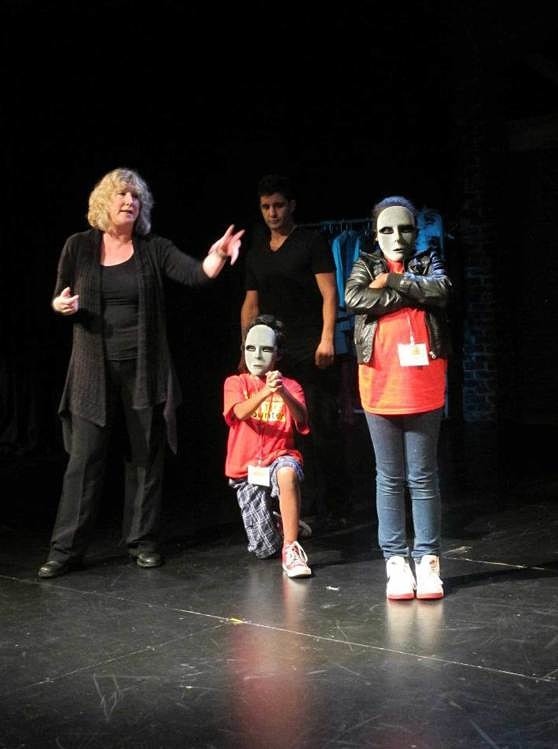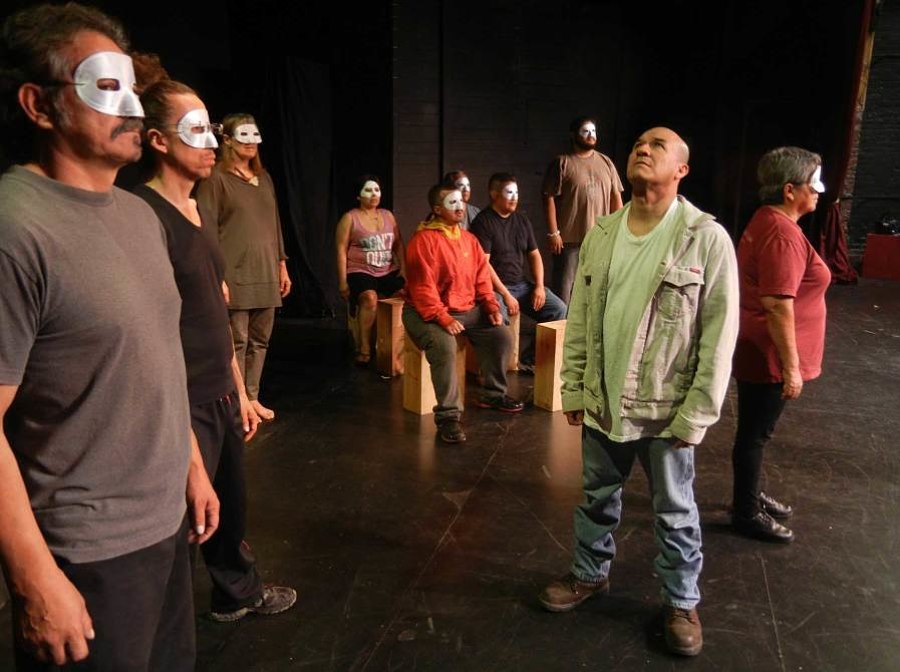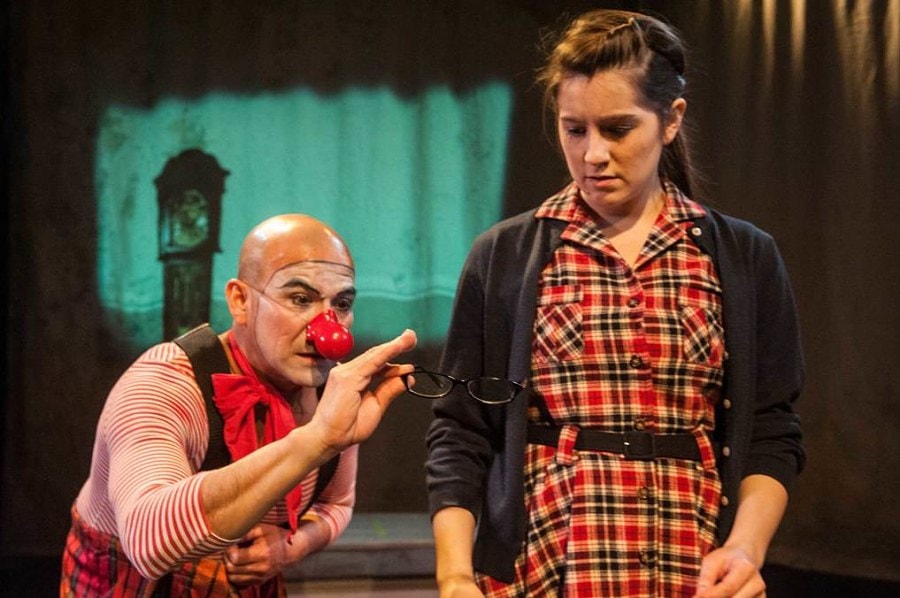Debbie Devine—tall, with blonde curls, an alto voice and a resonating presence—stands outside the green double doors of her 24th Street Theatre, located in a rough-and-tumble neighborhood of Los Angeles not far from the University of Southern California. Devine evokes, in her way, the city’s mysterious patron saint, Nuestra Señora la Reina de los Angeles—Our Lady the Queen of the Angels. In fact, she calls the 24th Street venue her church, recalling that a distraught woman recently wandered in through the open green doors, believing the place was an actual church.
For Devine, it might as well be. Theatre for her is a sanctuary in a city and a culture where sanctuary is often hard to find.

Devine is unfailingly kind but unmistakably assertive. When she’s dealing with a lobby full of children bused in by the Los Angeles Unified School District to see a play at the 99-seat venue, Devine will be heard. The woman can silence 100 kids screaming in English or in Spanish as efficiently as if she were using a bullhorn. (It’s just old-fashioned stage projection.) Running backstage to deal with an emergency, she moves like a gazelle.
Her purpose is always clear to her. Sometimes it’s less clear to others.
“Okay,” begins Jay McAdams, the slender, rich-voiced executive director of the theatre, who’s married to Devine. “We belong to L.A.’s 99-seat-theatre community, so there’s our first struggle to be taken seriously. And then, even within our community, people say, ‘Oh, so you do kids’ theatre’—which is like being at the bottom rung of a ladder that’s already lying in a cellar.”
But McAdams insists that “we’re not the Rodney Dangerfields of theatre—we’re more like salmon swimming upstream,” and that if the company were just looking for respect, they’d have hung their bucketful of awards in the lobby. Currently, most of those awards—from the L.A. Drama Critics and L.A. Weekly—are populating a dusty backstage corner (though it must be said that the troupe’s 2012 Peter Zeisler Memorial Award for Outstanding Achievement in the American Theatre, presented by TCG, occupies a place of honor near the entrance).
Devine, the theatre’s artistic and resident director, first met McAdams in 1986 at West L.A.’s Odyssey Theatre when he auditioned for Devine’s children’s-theatre troupe there. They’ve been partners onstage and off ever since.
Her 10 years at the Odyssey were “a great time,” Devine recalls, though she admits that she was frustrated that the theatre was mainly serving “white kids on the Westside.” In 1996, USC’s then dean of theatre, Robert Scales, was eager to help start a professional theatre near the university. He courted Stephanie Shroyer and Jon White-Spunner from Pacific Resident Theatre in Venice, along with Devine and McAdams, and the quartet proceeded to convert an abandoned warehouse on 24th Street into a performance space.
“We had no board, no money, no clue,” McAdams remarks dryly. “We just built the plane as we were flying it. It was an all-volunteer effort.”
There was a tension within the quartet about whether the theatre’s driving purpose was artistic excellence or service to a community plagued by poverty and cultural dislocation. Shroyer and White-Spunner eventually drifted away. But—in productions ranging from Adam Rapp’s Ghosts in the Cottonwoods to Arístides Vargas’s Spanish-language La Razon Blindada to Mike Kenny’s Walking the Tightrope—Devine and McAdams demonstrated that this was a false choice: They could achieve high artistic standards in a theatre that also served the community.
For Devine, this didn’t really present a conflict. The very reason she left the Odyssey was to be in, and part of, an underserved community. At the same time, as a director, she’s fastidious. Her approach to Walking the Tightrope, for example, was a stark contrast to so many stagings of de rigueur kiddie fare—she aims to treat all the company’s plays, aimed at youth or not, as adult works.
That fastidiousness partly explains why the theatre presents only one or two new works in a year—a European-style development model shared by the theatre’s crosstown colleagues at the Actors’ Gang. Once built, however, their productions play for months on end and are so good they’re often invited to tour.
A play for youth about coping with the death of a loved one? That’s par for the course at 24th Street. McAdams says that Kenny’s decade-old play did fine in Britain but couldn’t find a U.S. audience—until Devine got hold of it.
Kenny’s evocative play, set in a British seaside town, concerns a young girl (Micaela Martinez) who, on coming to visit her grandparents, discovers that her grandmother is missing. Her grandfather (Mark Bramhall) fibs almost whimsically that his wife has left to join the circus as a tightrope walker—which in turn arouses skepticism in the child, and triggers, in poetical terms, the mechanisms of grief, as both the girl and her grandfather come to terms with the death of the woman they each loved.
McAdams describes one of the early rehearsals when, as the grandfather, Bramhall recited the narration, “grandfather sits.”
“Don’t sit,” Devine instructed him.
“But the line says ‘grandfather sits.’”
“Just stand there, next to the chair,” Devine said, “and don’t sit just because the stage direction says so. Only sit when you have no more reason to stand.”
Her direction slowed the action, McAdams reports, but when Bramhall finally did sit, the physical gesture was filled with hitherto untapped richness and emotional gravity.
Devine also embellished Kenny’s play with a mute clown (Tony Duran) and a piano player (Michael Redfield), further underscoring her magic-realist vision. The L.A. reviews noted Devine’s ability to plumb depths of emotion without being mawkish or sentimental. The director points out that parents often have more difficulty with the dark themes of her one-hour production than their children, to whom Devine defiantly refuses to condescend.
Devine’s staging of Walking the Tightrope is currently winding up an eight-city tour (on what McAdams describes as a financially punishing Equity contract) at Culver City’s Kirk Douglas Theatre, the most westerly of Center Theatre Group’s three theatres, where it plays May 2–3.
The Theatre for Young Audiences tour comes on the heels of euphoric reviews for the show’s 24th Street Theatre run in 2014—“an indelible must-see for all ages,” ventured the L.A. Times. Devine postulates that “kids understand perfectly well the pain of loss, and they struggle like the rest of us with how to get through that darkness.” Or, as playwright Bryan Davidson puts it, “Devine and Adams shine the light to show the way out.”
Davidson was brought in to write the theatre’s next project, Hansel and Greta: Bluegrass, a play with music that’s being developed through actor improvisations. Slated to open in 2016, the play is set in 1930s Appalachia during devastating strikes in the coal mines.
Davidson’s first impulse was to develop the play around the theme of hunger. “That’s an issue in the theatre’s neighborhood,” he says, “but we soon realized there was also an emotional insecurity, linked to immigration insecurity—kids not knowing if or when their parents might be deported—so we expanded it to emotional hunger.” Davidson adds that Devine is an exacting dramaturge—if he shows her a scene that’s overly sweet or formulaic, he gets a frank response: “This is bullshit. You’ve written kids’ theatre. Make it real. Make me believe it.”
That devotion to rigor and authenticity, to elevating the widely disparaged theatrical subgenre of youth theatre, has won Devine and McAdams a slew of devotees from both educational and theatre circles.

Dr. Steven McCarthy is the K-12 coordinator for the Los Angeles Unified School District—the nation’s second-largest school district, in which 80 percent of the students are Title 1, meaning they are from families with low socioeconomic incomes who need federal funding to help close the achievement gap. McCarthy has been working with 24th Street Theatre “for many years on many levels,” both as an audience member and as a coordinator of field trips to theatre for thousands of children.
This year, LAUSD has a collaborative contract with the theatre, matching $50,000 for the $175,000 24th Street was able to raise from the Rosenthal Family Foundation. “We were able to fund field trips for 50 schools with 100 students in each school,” notes McCarthy. During economic hard times, LAUSD lost funding to support those field trips, but McAdams and Devine maintained the program regardless. “I think that’s a fair indication of their commitment,” McCarthy says.
He describes being particularly impressed with the sophistication and subtlety of the work. A typical show for student audiences “opens with a chair, with a spotlight on it. Debbie talks about that chair and what it means. Then the light goes out. When the spotlight comes back up, the chair has been knocked over, and the children start to see what the position of a chair means to them—such a deep level of learning through the simple task of moving the chair.” It’s an exercise, in other words, that helps the students “read” beneath the lines.
“We’re asking them to read the subtext” of the moment, McCarthy explains. “Nothing can produce more literacy in the nation than theatre.”
Sherri Leathers is director of programming for education at the Tennessee Performing Arts Center (where Walking the Tightrope recently toured), and she adds to the chorus of praise from around the nation. “Some adults wonder why any company would present this kind of dark work for young audiences,” Leathers offers. “This theatre company is brave enough to say, ‘Why not?’”
For all the talk of darkness and challenges rippling through the work of 24th Street Theatre, board president Leslie Johnson (who also serves as director of education and community partnerships for Center Theatre Group in Los Angeles) has a different perspective, taken from a teacher-training program in East Hollywood’s Barnsdall Art Park.
“Eighty teachers rotated through workshops conducted by a dance movement specialist, an artist who focused on mask work, theatre artists steeped in Augusto Boal’s Theatre of the Oppressed and such. People were crying, spilling their guts, it was intimate,” Johnson relates. “And then I get to Deb and Jay’s workshop and I hear guffaws of laughter—loudest of all, Deb! Making shapes with their bodies, totally unleashed, alive, joyful! Adults who looked like a class full of expressive, free, imaginative children.”
But if you want to know how 24th Street is really doing, just ask the neighbors. “I remember the first time I came to the theatre,” recalls nearby resident Ivonne Rodriguez. “I’d driven by on my way home from work numerous times, and one day when I saw the barn doors open I decided to stop. Jay provided me information on their After ‘Cool program for theatre training and literacy. I signed up my eldest son PJ and my daughter Belles, who were 11 and 6, respectively, at the time.”
Rodriguez describes how, after a couple weeks, she saw a change in PJ. “He was communicating better,” she says. “That kid had always struggled academically, and I noticed that he was beginning to speak more clearly. I saw his excitement just before he went to the program. He did not lose his shyness in front of an audience, but he was beginning to open up one-to-one. I then noticed that my daughter did the same.”
In 2013, when the theatre invited the community to work on a play for adults in a project called Teatro del Pueblo, Rodriguez herself was among the participants. She had been a high-school dropout, but her work with the theatre gave her the confidence to make up those credits; she now qualifies for admission to a four-year college.
Now, Rodriguez says, she goes by the theatre to have some tea or coffee, “because I really enjoy how I feel when I am in that space. There are so many elements intertwined together that the connection runs deeper than family. It is really a beautiful thing, what Jay and Debbie have created, and I feel blessed that they are nestled in my community and have touched the lives of each person in my family.”
Steven Leigh Morris is the theatre critic for LA Weekly and the founding editor of StageRaw.com. He is also a playwright.


